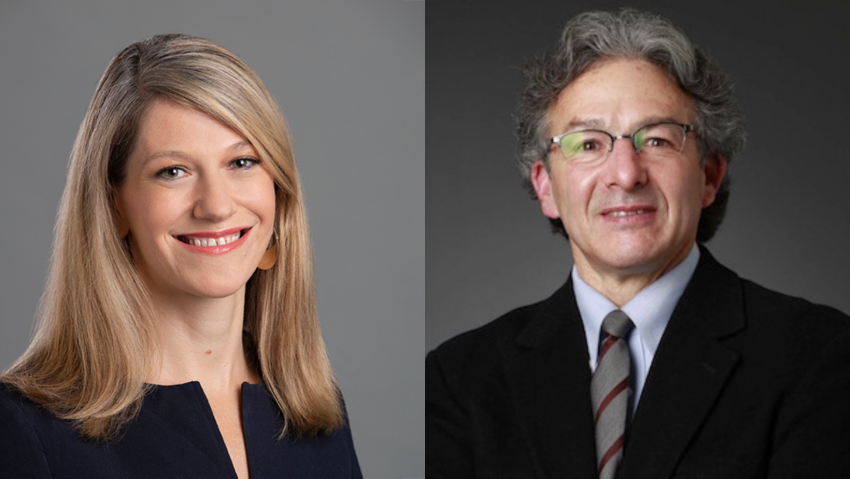
This article appeared in the 2023 edition of Cardozo Life magazine.
For Joaquin Winfield, April 7, 2023, will forever be a day to remember. That is when he was granted clemency by New York Gov. Kathy Hochul after serving 26 years in prison for possession of 4.6 ounces of crack. The disparity in sentences given to people from different races for similar crimes has been widely written about in recent years. Winfield was sentenced under the now-repealed Rockefeller Drug Laws of the 1970s and 1980s. He was sentenced to 37.5 years to life, one of the longest prison sentences in the state for a non-violent drug-related conviction. He was not eligible for parole until 2034. Now, thanks to the Criminal Defense Clinic’s clemency appeal to Hochul, Winfield will be eligible for parole in the fall of 2023.
“We felt the need to do whatever we could on his behalf,” said Professor Kathryn Miller, co-director of the Cardozo Criminal Defense Clinic, who noted that 58-year-old Winfield is in declining health. “The laws that put him in prison are no longer in effect and widely seen today as draconian. He deserved a chance to seek parole.”
The professors and clinic students, some of whom are now alumni, will continue to assist him during his parole hearing. They are committed to working on his case for as long as he needs them. The students have also been representing incarcerated people in similar situations since the beginning of the pandemic. They have formed close bonds with many of them, which has enabled them to write compelling and personal arguments as to why they deserve a second chance.
Criminal Defense Clinic student Sarah Schwartz ’23 said in a Law360 article, “I know that he's grateful for us, and he always really expresses that. It's hard, I think, to understand how you come to terms with spending 26 years in prison.”
The team working on Winfield’s case consisted of clinic co-directors Miller and Professor Jonathan Oberman and Cardozo alumni Tziona Breitbart ’21, Jenna Dunton ’22, Ali- son Goldman ’21, Michael Gorodetsky ’21 and Isabelle Schwartz ’22 and students Brandon Boschi ’23, Rebecca M. Laden ’23 and Schwartz.
According to Miller, when Winfield originally went up for resentencing in 2005, the judge re-imposed the original sentence “in part because of the original trial judge's statement that Mr. Winfield was a drug kingpin, which was not true.’’ He sold marijuana and cocaine and was convicted of possession of 4.6 ounces of crack, but the description of the trial judge stuck and shaped the appeals court judge, according to Miller.
The Criminal Defense Clinic has focused more on clemency issues in recent years. It was founded by Professor Barry Scheck in 1980, who later co-founded The Innocence Project at Cardozo with Peter Neufeld. Oberman has supervised the work of the clinic since 1994 after Scheck began work at The Innocence Project.
The clinic witnessed its fair share of changes in the legal world throughout its 43-year history, particularly those that took place in 2020 during the pandemic and the Black Lives Matter movement. Those events had a major impact on public perceptions of the justice system and the courts and the work of the clinic.
Getting a second chance often requires prosecutors' agreement. Whether there has been a significant change in practice within prosecutors’ offices in recent years is unclear.
Despite the progress made in some individual cases and public opinion, Miller and Oberman do not perceive any major shift. They said there is much more to be done to address and reduce systemic racial disparities in sentencing.
“In the courtroom of public opinion, and people’s notions of change around the criminal legal system, some significant things have happened,” Oberman said. “But the critical mass of the engine that drives the system toward the over incarceration of people of color, that engine is largely unaffected three years post-George Floyd. If America had a racial reckoning, it was short-lived. What we are experiencing is not a committed reckoning to ameliorate racism.”
Miller agreed, adding, “There was a lot of promise that came from the conversations had after the death of George Floyd. A lot of the optimism around reform hasn’t been realized in subsequent years. There have been steps forward like New York’s discovery rule, but other efforts in criminal reform haven’t happened.” [Recent changes in New York Criminal Procedure Law require that the prosecution pro-vide discovery to the defendant as soon as practicable, otherwise it must be provided no later than 20 days if the client is in jail, or 35 days if the client is not being held].
Oberman said there has been little change on a national scale in addressing sentencing, arrest and application of release disparities along racial lines.
He said, “Progressives have lost the current public debate over questions of public safety by conceding the terms of debate that accepts a flattening equivalence between notions of our shared safety and arrests, prosecution and punishment. Post-George Floyd, ‘defund’ became an easy word to pinpoint and turn conversation away from reform.”
Other states, including California, have begun to take strides forward in criminal justice reform. The California Racial Justice Act prohibits the state from seeking or obtaining a criminal conviction, or from imposing a sentence, based upon race, ethnicity or national origin. It was passed in 2020 and is the first of its kind, making it possible for a person charged or convicted of a crime to challenge racial bias. Miller said it remains to be seen how effective it will be in the long run and whether other parts of the country will follow suit. “It would be great to see something like this enacted in New York,” Miller said.
